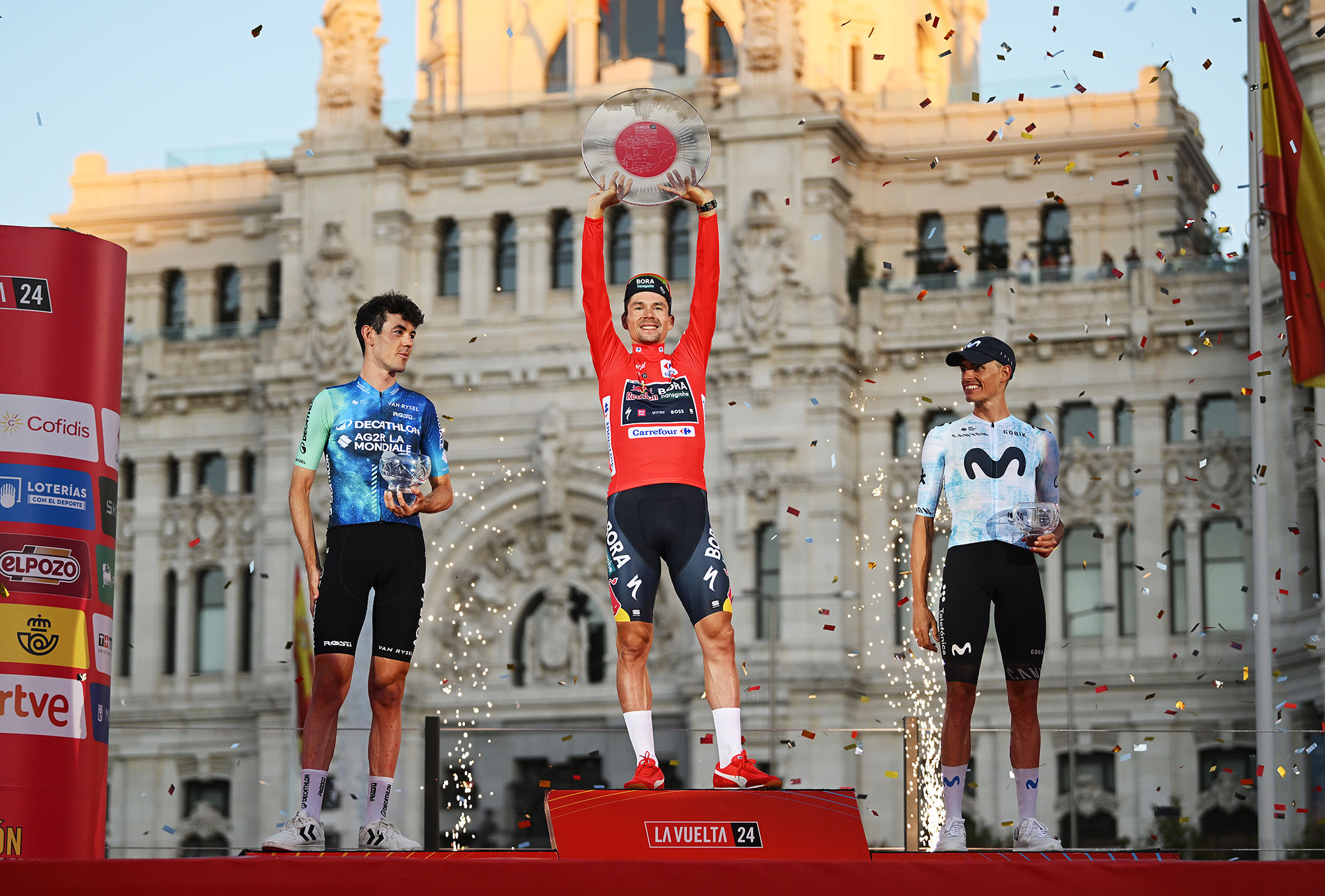
The Vuelta a España ended with the expected winner, but the narrative of the race didn't exactly run smoothly. After Tadej Pogačar's exhibitions at the Giro d'Italia and Tour de France, this was a very different kind of Grand Tour, with ample tactical intrigue to match.
Several expected contenders fell by the wayside in the opening half of the race, but there was still no shortage of riders playing leading roles across this Vuelta. Ben O'Connor's two-week stint in the red jersey will linger long in the memory, as will Wout van Aert's remarkable sequence of stage wins and jersey hunting, which was cruelly cut short on the descent of the Collada Llomena.
Kaden Groves quietly underscored his status with a hat-trick of sprint wins, while Eddie Dunbar garlanded the race with two fine victories. Kern Pharma were, by a distance, the biggest surprise of the race, while Mikel Landa's peaks and troughs were a key part of the story.
The race ultimately belonged, of course, to Primož Roglič, but his path to victory was not entirely smooth. We look at the defining moments of his record-equalling fourth Vuelta triumph.
Roglič proves he is back in the game
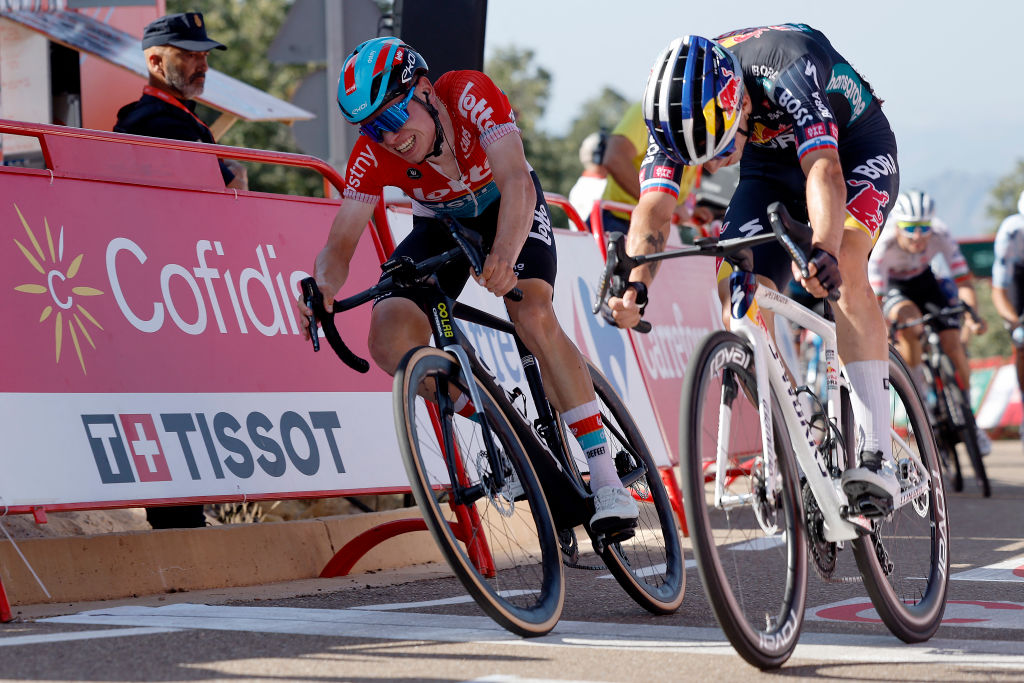
As the confetti from the victory celebrations settled on the Plaza de Cibeles last night, a fourth record-equalling overall win for Primož Roglič in the Vuelta a España may have felt like this year's race was business as usual. But rewind four weeks and before the Vuelta getting underway, his chances of a triumph looked far more slender than the final result would suggest.
Roglič's total absence of racing, let alone results, since his crash and fractured back injury in the second week of the Tour were hardly a source of optimism about his chances. The team's total silence on his chances of participating further amplified the uncertainty and speculation, and it was only with less than a week to go that the Slovenian's provisional place on the start list was confirmed.
By then, the sense that there was a power vacuum to be filled was well and truly established and the absence of GC contenders of the calibre Tadej Pogačar, Jonas Vingegaard and Remco Evenepoel on the Lisbon start line extended it yet further. Then there was Roglič's insistence on pointing out how his back still gave him grief in his pre-Vuelta press conference. Compared to the extremely narrow field of standout candidates for the Giro d'Italia and Tour de France, the 2024 Vuelta was by some distance looking set to be the most open Grand Tour in years.
In the first week of the Vuelta a España, Red Bull-Bora-Hansgrohe continued to play down Roglič's chances, arguing that his impressive stage 1 time trial, where he finished ahead of all his GC rivals, bore no relation to how he might be able to fight in the mountains. "So I wouldn't draw too many conclusions, saying - 'Ah if he can go all out on the TT bike, it must be a piece of cake on the road bike, too,' team manager Rolf Aldag told Cyclingnews before the stage.
However, all it took was three kilometres of tough climbing at the finale of a blisteringly hot stage 4 to Pico Villuercas, the race's first summit finish, and suddenly Roglič was back as the man to beat in the Vuelta a España.
At the foot of the steepest part of the climb, Lidl-Trek and T-Rex QuickStep controlled the peloton only for Pavel Sivakov (UAE Team Emirates) to drive his way clear. Yet the Frenchman's efforts - as sadly so often happened in this Vuelta to the gutsy UAE rider - did not reap any rewards. Instead, his acceleration seemed to provoke Roglič into action, and he attacked with such power that a field that was already down to a dozen, suddenly shrank to just two riders on his wheel - Enric Mas (Movistar) and Lennert van Eetvelt (Lotto Dstny).
With the benefit of hindsight, there were also hints that Roglič was not at his absolute best or was not certain of his underlying strength. Rather than up the pace further to drop his two most persistent rivals, the tempo allowed João Almeida (UAE Team Emirates) and Matthew Riccitello (Israel-Premier Tech) to make it across to the tiny front group at less than two kilometres to go. But when Mikel Landa (T Rex-QuickStep) brought the group's numbers up to six and promptly attacked, Roglič proved there was some fuel left in the tank with a rapid response, and he out-sprinted Lennert van Eetvelt (Lotto-Dstny) at the summit for the win.
In sneaking past the Belgian after he celebrated too soon, Roglič echoed how he claimed Liège-Bastogne-Liège in 2020 against Julian Alaphilippe. But the importance of his 20th Grand Tour stage win paled compared to the GC message Roglič sent.
His overall advantage of eight seconds after stage 4 over Almeida was minimal, and his 32-second lead over third-placed Mas was barely any greater. But given the destruction he had dealt to the other GC contenders in a climb this short - building his overall advantage to 1:14 on Sepp Kuss (Visma-Lease a Bike), 1:30 on Carlos Rodriguez (Ineos Grenadiers) and over two minutes on Richard Carapaz (EF Education-Easy Post) - nobody could doubt that Roglič was once again the man to beat.
For any other rider, it would have all but beggared belief that the performance came six weeks after a crash in the Tour de France left him with a fractured vertebra. But Roglič has a sad track record of rebounding from disappointing Tours de France in the Vuelta. Pico Villuercas again showed the Red Bull-Bora-Hansgrohe rider's resilience.
Ben O'Connor erupts into the Vuelta's GC race
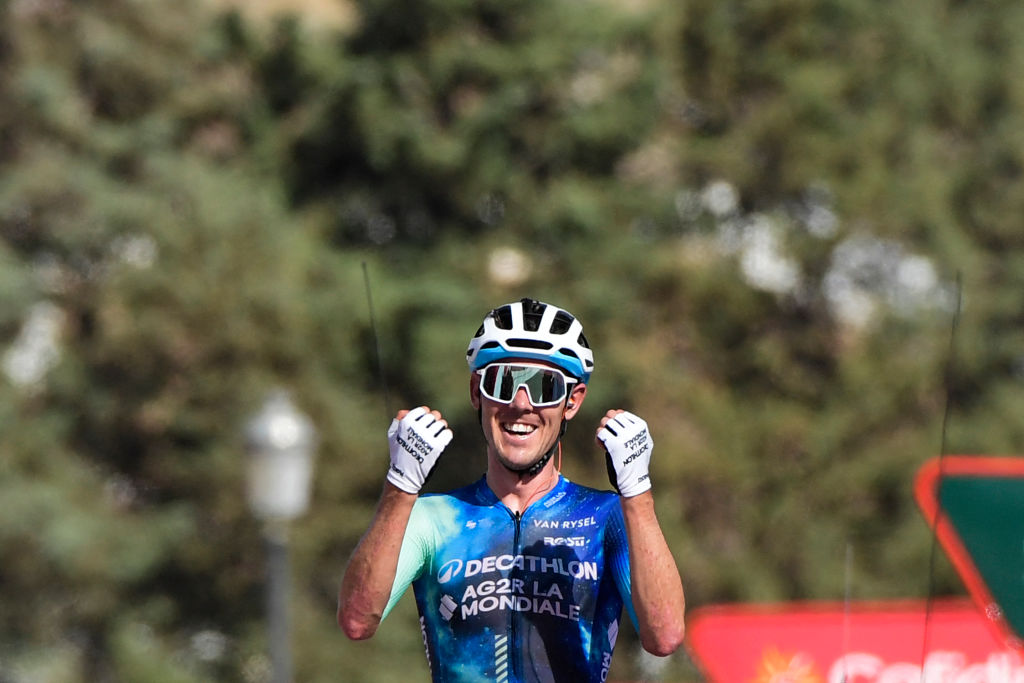
"We'll see at the end of the race," were Primož Roglič's only words to the media when he was asked after stage 6 about the GC earthquake that had just ripped through the Vuelta a España. The triple Vuelta winner was being asked about the only question that mattered at that point - whether Red Bull-Bora-Hansgrohe had made a mistake that day by letting solo breakaway rider Ben O'Connor gain over six minutes on the main peloton and move into the red jersey by an almost equally massive margin.
But even if the Slovenian wasn't at all happy to discuss the new race scenario with the media, the shockwaves of what O'Connor, previously two minutes down and 23rd overall, had achieved on a seemingly inoffensive-looking transition stage resounded through the rest of the Vuelta. And they came far closer to sinking Roglič's chances of a fourth overall win than he or his team would have liked.
Before O'Connor's move, the most likely reason stage 6 seemed set to earn landmark status in the 2024 Vuelta had been the bizarre setting for the stage depart, with riders lining up in the interior of a gigantic Carrefour supermarket. After weaving their way past shopping trolleys and checkout desks, the first major step towards stage 6 gaining considerably more importance than predicted came when O'Connor snuck into a breakaway of 30 riders early on.
Riding through rolling but by no means overly tough terrain, with 27 kilometres to go and the time gap ticking steadily upwards, O'Connor left the last of his breakaway companions and began his solo run towards victory. It's a given in cycling strategy that all the GC teams should have already united to prevent a new joint enemy like the Decathlon AG2R La Mondiale leader from emerging.
But Red Bull had already only made a half-hearted attempt to stop the Australian and by then, the horse had already bolted, so it was barely a surprise that there was virtually no collaboration behind. Movistar, Visma-Lease a Bike, Ineos and UAE were essentially telling Red Bull that O'Connor's upsetting the established GC order was a mess of their own making, and it was up to them to clean it up.
"Things didn't play out as we wanted," sports director Patxi Vila told Spanish television.
"The start was really fast-moving and the break of the day [containing O'Connor, Red Bull-Bora-Hansgrohe's Lipowitz and 28 others) was a really strong one. Lipo' was in there, and we thought he would have no problem staying with Ben and we'd get another option on GC," Vila said. Instead, he confirmed with considerable understatement, "Things got out of hand."
Bizarrely enough, this wasn't the first time a seemingly inoffensive breakaway through this part of Spain ended by turning the Vuelta upside down. An almost identical scenario arose in the 1990 race that finished in Ubrique, another small Andalusian hilltown just a few dozen kilometres away from Yunquera. Despite having a string of top ten GC places in the Giro d'Italia in the second half of the 1980s, when Italian Marco Giovannetti infiltrated his way into a transition break on stage 5, nobody seemed overly bothered given Banesto, the dominating Spanish team of the era, had their one of their 'super-domestiques', Julian Gorospe, in the same move.
But then Gorospe cracked a few days later and ceded the red jersey to Giovanetti and - given the scale of his lead - for all the predictions the Italian would crack, no matter how much time Giovanetti lost on each mountain stage to Banesto's GC counterattackers, Giovanetti still had enough to claim the only Grand Tour victory of his career.
Even if Red Bull's directors had not brushed up on their Vuelta history beforehand, there was a far more recent example for them to understand why it was so risky to let a rider with fourth places on GC in the Tour and Giro gain such a massive advantage.
In the 2023 Vuelta, Sepp Kuss - normally not an overall threat with teammates Roglič and Jonas Vingegaard as leaders - formed part of a midweek breakaway en route to a summit finish and used that as a foundation to gain the overall victory. Given those events were so fresh in the collective Vuelta a España memory, Red Bull-Bora-Hansgrohe relying on Lipowitz, riding his second Grand Tour after abandoning the Giro in May, to handle O'Connor or to spark the other teams into action, seemed like a high-risk strategy. Sure enough, with Roglič now forced to fight to overhaul O'Connor's 4:51 advantage, the top pre-race favourite found himself in serious trouble - particularly as the concerns about his back injury still lingered.
"Before the Vuelta, I had said to the team management: 'It will have to be done in seconds, not minutes'," Roglič's trainer Marc Lamberts told Het Laatste Nieuws on Monday about how he and the Slovenian had originally aimed at winning.
"Primož is not Tadej Pogačar or Jonas Vingegaard, who can gain two minutes on a long climb... And what happened then? They gave Ben O'Connor more than six minutes as a gift. That was a deficit that Primož had to make up somehow.
"I was very unhappy with that situation, knowing what Primož's great strength is when he can race defensively and follow the wheel of someone like [Enric] Mas until the last five hundred metres and then shoot away. Now, suddenly, Primož had to attack."
Ben O'Connor holds firm at Sierra Nevada
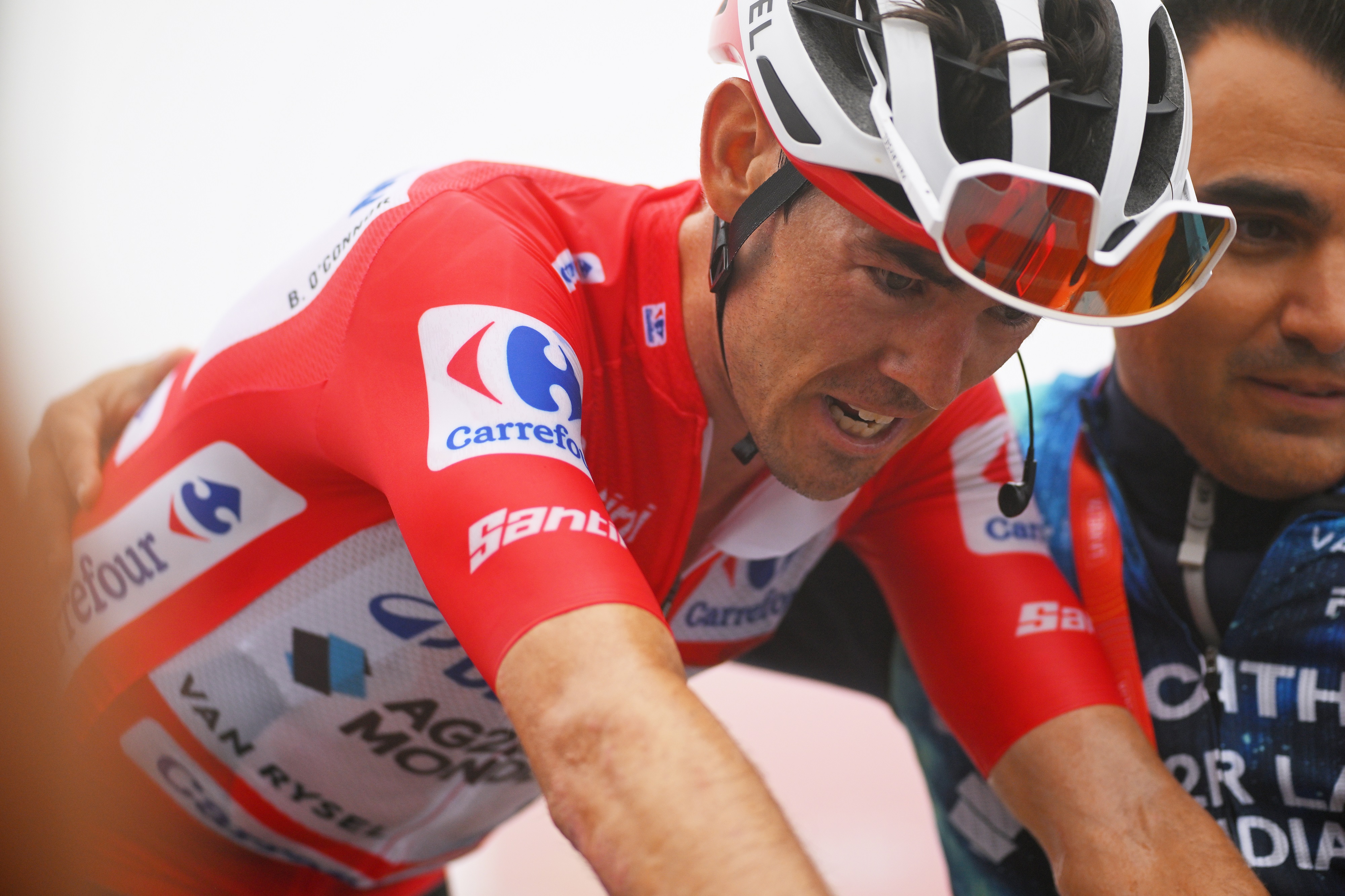
For Vuelta a España race leader Ben O'Connor, it seemed, by the epic trek through the foothills of Sierra Nevada on stage 9, the writing was well and truly on the wall. When the Australian and the peloton set out on what was by far the toughest stage of the first week in blazing southern Spanish heat, the Australian had already been in serious trouble - and it seemed as if more was to come.
At Cordoba on stage 7, Primož Roglič began his mission to reconquer the red jersey by snatching back six seconds' worth of time bonuses over the top of a late climb. Even if that minor skirmish barely dented the Australian's overall advantage of nearly five minutes, at Cazorla's steep uphill finish the next day, a much more serious attack by Roglič caused far more damage to O'Connor than he had expected. Suddenly another 56 seconds had been sliced off his GC grip.
After such a stinging defeat on a relatively minor climb in Cazorla, O'Connor's chances of remaining in red when the peloton crossed the sun-cracked ramps of 15 to 20% on three category 1 climbs in the Sierra Nevada on stage 9 were widely predicted to be minimal. Midway through the stage, Spanish television commentators showed how low they rated the Australian's chances that they were already beginning to use leading favourite Roglič's position overall as the reference point for all the other GC riders, ignoring O'Connor's position in red.
However, it turned out that O'Connor put up a fierce resistance and it was Roglič who came away from Sierra Nevada with more questions than answers. Furthermore, O'Connor even managed to slightly expand his lead by four seconds, by finishing third in Granada.
"I think we were really composed," O'Connor said afterwards. "It shows that we're here to still fight. Every second counts."
Just because O'Connor came through the day's racing unscathed did not mean there were no attacks or movement on the GC front. The first big change had come even before the day's action had begun as one of UAE's main GC challengers, João Almeida, had to pull out with COVID-19. Then on a stage with more than 4,000 metres of climbing, UAE Team Emirates launched a powerful three-man early attack with Marc Soler, Jay Vine and Adam Yates, which culminated with Yates charging away 60 kilometres from the line to claim a solo victory and move to within two minutes of Roglič on GC. Equally impressively, former Vuelta podium finisher Richard Carapaz (EF Education-EasyPost) blasted away from even further out and completed a 90-kilometre move in second place behind Yates to move up to fourth.
Last but not least, Enric Mas (Movistar) managed to achieve the previously inconceivable: For the first time in his career, he dropped a group containing Primož Roglič in the mountains to gain a minute's advantage. Had Mas not nearly crashed on the fast descent to the finish in Granada when a crosswind caused his bike to swerve, his attack might have pushed the Spaniard into an even stronger overall position than fourth behind O'Connor.
One of the few major GC contenders who did not attack even once was Primož Roglič. Contrary to all expectations after he wreaked havoc on his rivals on two previous summit finishes at stage 4 and stage 8, not to mention having his team put in some solid work on the approach roads to the second decisive ascent of Hazallanas, Roglič failed to move.
Instead, the Slovenian stayed on the wheels all the way up the notorious difficult Sierra Nevada ascent - one he knew well from multiple altitude training camps. He did not budge when Mas, already shown to be a dangerous rival at Villuercas and Cazorla, charged away. Roglič's greatest achievement on stage 9 was not losing more time than four seconds to O'Connor rather than making a race-winning move.
As a result, the Vuelta headed for its long transfer north with an unstable GC stalemate even if Roglič remained the reference point. However, after Sierra Nevada, the clouds of uncertainty surrounding Roglič's ability to produce sustained efforts on major mountain stages and take the race by the scruff of its neck had not disappeared. Meanwhile, O'Connor was still very much in control of the race, and nothing, it seemed, could be completely ruled out - not even O'Connor winning.
Curious Asturias as Roglič can't hammer home Ancares message
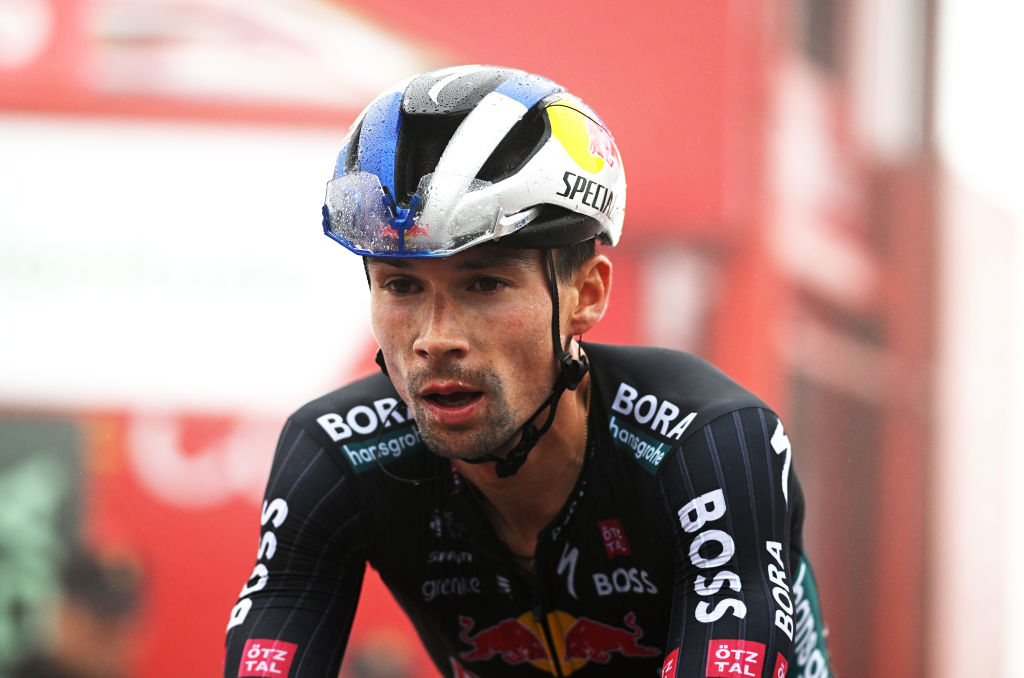
When the Vuelta reached the Puerto de Ancares on stage 13, the race finally looked set to follow its preordained script. Having already chipped handfuls of seconds off O'Connor's lead during the race's sojourn in Galicia, Roglič proceeded to put two minutes into the red jersey on the wickedly steep slopes of the Ancares.
Just as importantly, he burnt Enric Mas off his wheel, gaining a minute on the Mallorcan in the process. Although O'Connor still held the jersey, Roglič looked increasingly like the presumptive Vuelta winner. As the race headed into ever more mountainous terrain, the direction of travel seemed obvious.
Curious things tend to happen, however, whenever the Vuelta reaches the misty, green mountains of Asturias. The summit finishes at Cuitu Negru on stage 15 and Lagos de Covadonga on stage 16 seemed obvious places for Roglič to hammer home his authority and wrest the maillot rojo from O'Connor, but the Vuelta is rarely that straightforward in these parts.
Amid the fog that enveloped the upper reaches of Cuitu Negru, Roglič looked to replicate his Ancares exhibition, but he found his rivals harder to shake. Mas held his wheel and later even briefly distanced Roglič, while O'Connor limited the damage well. At the summit, Roglič was in such a state of confusion that he even seemed under the impression that O'Connor had gained time on him.
Later that evening, O'Connor would make a gain, at least in a manner of speaking, as Roglič was docked 20 seconds by the commissaires for drafting behind a team car after a bike change. The Australian entered the rest day with his lead still over a minute, though Roglič was widely expected to make up that ground when the race resumed at Lagos de Covadonga.
A rainy day in Asturias cast doubt on the previous certainties of the Vuelta, and not for the first time. Roglič's anticipated attack never came. He chose – or was he compelled? – to race conservatively, and he even betrayed a fleeting sign of difficulty in tracking Mas' acceleration. Behind, O'Connor did enough to save his red jersey by five seconds. Although Roglič was still inching in the right direction, his path to overall victory was proving more complicated than expected.
Roglič endures amid Red Bull's shows of strength and weakness

All through the Vuelta, Red Bull-Bora-Hansgrohe directeur sportif Patxi Vila had spoken of the need for his team to be as fresh as possible for the Vuelta's demanding final acts in the Rioja and Burgos. And even though Roglič had been the reference point for everybody in the race since stage 4, Red Bull had largely managed to avoid having to control the peloton, with Decathlon-AG2R, Movistar and even Soudal-QuickStep more often taking up the reins on key days.
Red Bull's flexes were limited to set-piece occasions like the Ancares on stage 13 and, above all, the Alto de Moncalvillo on stage 19, where Roglič's team shredded the red jersey group from the very bottom of the climb. With 6km to go, three Red Bull riders – Daniel Martinez, Aleksandr Vlasov and Roglič – simply ripped clear of the rest.
That dramatic lead-out teed up Roglič's most striking solo exhibition since his win at Lagos de Covadonga three years ago. His stage victory brought him the red jersey with a lead of 1:54 over O'Connor, while Mas essentially conceded defeat at the summit. Red Bull's collective might, meanwhile, meant that the defence of the maillot rojo on stage 20 seemed a formality, despite almost 5,000m of climbing.
The Vuelta hadn't quite done Vuelta-ing. When Vlasov and Martinez were inexplicably dropped early on stage 20, it was clear that something was amiss. Martinez and Patrick Gamper would soon abandon, while a struggling Nico Denz finished just outside the time limit. Even before the stage finished, word began to filter through of a wave of illness within the team, but Roglič held firm on the road to Picón Blanco.
It helped that Roglič still had teammates Roger Adria and Florian Lipowitz for company, and questions could be asked, too, about the relative passivity of Mas and Carapaz. But above all, it was Roglič's poise that stood out. On the final climb to Picón Blanco, Roglič even offered something of a throwback to the days of Miguel Induráin when he opted to control the red jersey group by riding at the front himself.
Whether it was a bluff or a show of force, the end result was the same. Mas hesitated until the upper portion of the climb, by which point it was long since clear that stage victory and second overall were the summit of his ambitions at this race.
The following evening, when Roglič placed second in the Madrid time trial to seal a record-equalling fourth victory, he revealed that he, too, had come down with the same illness as his teammates on the final day. "But in the end, I was way too far, I had to finish it off," Roglič shrugged.
In a Vuelta of wild fluctuations, the most consistent rider by far had stayed the course better than anybody else. O'Connor, the runner-up, summed up Roglič's winning philosophy better than anyone. "He's very well aware of what his strengths are," O'Connor said. "He makes it count on the days when he was at his strongest. And I think he does a really good job of limiting the days where it's not exactly in his ballpark."







